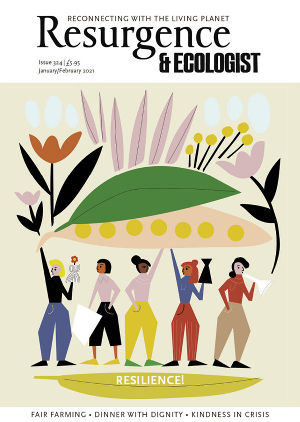The manner of young reviewers everywhere is to tick off a new book for not drawing on the latest scholarship. I was wary of this coming to Alastair McIntosh’s treading into my field of the social impacts following the IPCC predictions. Well, this book is steeped in the scholarship – if anything the first three chapters would be dry and technical if McIntosh weren’t a good writer regularly interspersing the data with anecdotes. But McIntosh is at his best, not as a populariser of science, or summing up policy briefs on how we can keep to 1.5°C warming, but on the intangibles.
McIntosh’s other books include explorations of the psychology, spirituality and hidden histories and ecologies underpinning living well – together. Riders on the Storm is structured around a pivot, the first half recapitulating the latest science around climate change – basically a précis of the latest IPCC reports. The second half delves deeper and curates an array of insights, quotes and vignettes about why any supposedly external crisis – in this case ecological – says as much about internal workings within us as it does about ‘out there’ facts and figures.
The heart of this book lies in this structure. No matter how exhaustively you cover the ground of the ‘science’; no matter how clearly, coherently and concisely you explain the ‘facts’; no matter how fairly and even-handedly you weigh the evidence and the special interests – ExxonMobil executives, anyone? – this will never be enough. This book is factual, clear and fair, but there remains something other, something numinous, something that words cannot quite capture, that lies at the heart of our relationship to the world. Into this space step the explanations McIntosh offers: psychology, spirituality, mystery. It is not only the world–self relation that he brings to bear. More precisely, it is the relationship itself: including self–other, and even self–self.
The book’s title phrase ‘survival of being’ comes from the philosopher Raimon Panikkar, and refers to the ‘foundation of all things’. It is this expansive, larger framing that McIntosh seeks for the book. He reaches for the latest science, and explains the high-level IPCC reports in a down-to-earth manner. Yet McIntosh looks higher still – or should that be deeper? Ultimately he seeks to place climate science within a more spiritual understanding of what it is to be human: to act as an ecological agent. Not as a god, commanding and reordering the world around us, but by taking a human place within an ecology of life. For the human to be ecological is thus at once a humble, de-centring process, but it is also one that takes our responsibilities seriously – not shying away from the ability, and even necessity, for stewardship. We don’t have to delve too deep to see traces of McIntosh’s Quakerism and the metaphors he playfully pinches from a whole gamut of religious traditions. We have a hand on the tiller, and we ought to grasp it carefully and firmly, not limply or recklessly.
McIntosh’s psychological insights include individual denial of how people can do atrocious things and still think themselves decent people. On a larger scale, what explains humanity’s willingness to burn huge amounts of fossil fuels when humanity is aware that burning fossil fuels causes climate change? This seems to be where the next stage of ecological consciousness-raising should direct its attention. The age of climate denialism is over: we are now in an era of displacement, dissociation and projection. This book is a great guide.







